Plenary Line Up
The daily plenary sessions feature some of the world’s most distinguished HIV scientists, policy specialists, and community leaders. Plenary sessions bring all conference delegates together at the first session of every morning.
Presentation dates and titles are subject to change.
Monday, 24 July 2017
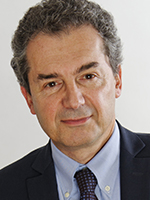
Harnessing the Immune System to Prevent and Control HIV Infection
Yves Lévy, France
Yves Lévy, MD, PhD, is the Chief Executive Officer and Chairman of INSERM (The French National Institute of Health and Medical Research). He also leads Aviesan (The French National Alliance for Life Sciences and Health) and is Professor of Clinical Immunology at the University Hospital Henri Mondor of Créteil. He has coordinated and developed several national and international clinical trials of immunotherapies and vaccines for HIV infection and other infectious diseases. His scientific career has focused on combining basic science and clinical translational research.
Since 1985 Professor Lévy has worked successively in several INSERM research units. In 2006, he became Scientific Director of the Vaccine Research Programme at ANRS (The French National Agency for Research on AIDS and Viral Hepatitis). In 2011, he created the Vaccine Research Institute (VRI) to develop effective vaccines against HIV. A large network of 18 teams and international experts from different institutions in France and the United States implements the VRI. From 2010 to 2012, Professor Lévy was Vice-Dean of the Faculty of Medicine at the Paris-Est Créteil University and he subsequently became a Special Advisor to the French Minister for Higher Education and Research from 2012-2014. In 2016, he was appointed to the United Nations (UN) Global Health Crises Task Force by Former UN Secretary-General Ban Ki-moon. Professor Lévy obtained his medical degree in 1986 from Créteil University and his PhD in 1991 from Paris Diderot University.
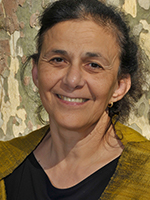
Persons Living with HIV: Top Priority for Programmes
Wafaa El-Sadr, United States
Wafaa El-Sadr is University Professor of Epidemiology and Medicine and Mathilde Krim-amfAR Professor of Global Health at Columbia’s Mailman School of Public Health and College of Physicians and Surgeons. Through ICAP at Columbia University, the Centre she founded more than a decade ago, she was instrumental in developing large-scale programmes in sub-Saharan Africa and Asia that integrate research, education, training, and practice. ICAP works closely with United States government agencies, international organizations, academic institutions, private sector, community-based organizations, and civil society groups in the pursuit of responsive, inclusive, sustainable, and innovative approaches to addressing global health threats and achieving public health impact. ICAP supports the education, training, and mentorship for a variety of healthcare professionals with a special emphasis on support for the nursing workforce. Dr El-Sadr’s research interests are diverse and include research on the prevention and treatment of HIV, tuberculosis, non-communicable diseases, and maternal and child health among others. She received her medical degree from Cairo University, a Master’s degree in Public Health from Columbia’s Mailman School of Public Health, and a Master’s degree in Public Administration from Harvard University’s Kennedy School of Government. She was named a McArthur fellow in 2008 and is a member of the Institute of Medicine of the National Academies.

Adding D to the ABC: Putting the Drugs in the ABC of Prevention
Sheena McCormack, United Kingdom
Sheena McCormack, MBBS, MSc, FRCP, Dip Ven, is a Clinical Epidemiologist, who has been coordinating HIV prevention trials since 1994 when she joined what subsequently became the Medical Research Council Clinical Trials Unit (MRC). From the outset, Professor McCormack has worked on HIV vaccine trials, all Phase I/II, in Europe and Africa. Since 1998, she has been involved in microbicide trials and was Chief Investigator of a Phase III vaginal microbicide trial that enrolled 9,385 women through six research centres in Southern Africa. She has been a consultant in HIV/genitourinary medicine since 1991, initially at the Royal Devon and Exeter Hospitals and since 1996 at the Chelsea & Westminster Hospital.
Professor McCormack recently reported the PROUD pre-exposure prophylaxis (PrEP) study conducted in gay men and other men who have sex with men, which showed a very high level of effectiveness for daily oral Truvada in the real world setting of 13 sexual health clinics in England. PROUD was the first HIV prevention trial to use a randomization to immediate or deferred access in order to compare PrEP to no-PrEP, and assess the impact on risk behaviour, and determine if any change in this would undermine efficacy. Although her primary and current focus is to ensure that PrEP becomes available to those who need it in the United Kingdom and Europe, she continues to work on HIV vaccine trials and maintains an interest in microbicides. She became Professor of Clinical Epidemiology at Imperial College London in 2012, and joined the University College London (UCL) in 2013 when MRC became part of UCL.
Tuesday, 25 July 2017
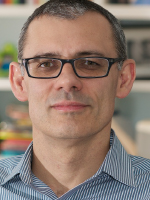
HIV Restriction Factors: From Bench to Bedside
Paul Bieniasz, United States
Paul Bieniasz, PhD, is Head of the Laboratory of Retrovirology at the Rockefeller University and an Investigator at the Howard Hughes Medical Institute. His work has provided key insights into the fundamental mechanisms by which HIV-1 replicates and subverts the functions of the cells that it infects. Professor Bieniasz’s studies have focused particularly on retrovirus particle genesis and on the discovery and characterization of host cell genes and proteins that have antiretroviral activity. His group and collaborators have exploited these basic findings to generate new animal models to study interventions in HIV-1 infection and AIDS. As well as a particular interest in HIV-1 virion genesis and antiviral proteins, he also has a broad interest in the molecular biology of retroviruses. Professor Bieniasz pioneered the field of paleovirology, and over his career has contributed to our understanding of retrovirus entry, post-entry events, and transcription.
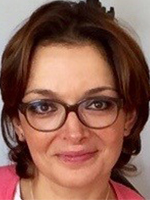
Economic Incentives for HIV Prevention in Latin America
Sandra G. Sosa-Rubí, Mexico
Sandra G. Sosa-Rubí is a Health Economist with a Master’s degree in Health Economics from the Center for Economic Research and Education in Mexico and a PhD in Health Economics from the University of York. For over 10 years, she has been an Investigator at the Health Economics Unit at the National Health Institute in Mexico. Her research is directed at risk behaviours associated with HIV infection among men who have sex with men (MSM) and male sex workers (MSM) in Mexico and Central America. Specifically, she studies the effect of the use of economic incentives in linkage to care and changes in sexual behaviour among MSM and MSW.
Dr Sosa-Rubí is currently the Principal Investigator of the project “Development of a Mobile Program Prototype for Improving Retention and Adherence of HIV Patients in Mexico City”. This project aims to improve the linkage to HIV care and HIV treatment adherence among MSM using mobile messages between physicians and patients. She is also a researcher for several projects that test the effectiveness of other behavioural incentives through multimedia technological applications for MSM and the efficiency of the provision of HIV prevention interventions (prevention of mother-to-child transmission, HIV testing and counselling, and male circumcision) in sub-Saharan Africa. In 2011 and 2013, Dr Sosa-Rubí assisted in developing a national survey to estimate the HIV prevalence and risk behaviours among MSM in Mexico in order to evaluate HIV prevention interventions funded by the Global Fund to Fight AIDS, Tuberculosis, and Malaria.
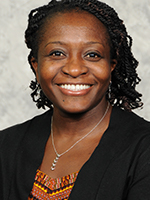
What Will It Take to End Paediatric HIV: The Emergency Plan
Nadia Sam-Agudu, Nigeria
Nadia Sam-Agudu is Senior Technical Advisor for the Paediatric and Adolescent HIV Programme at the Institute of Human Virology-Nigeria and the Institute of Human Virology at the University of Maryland School of Medicine. She is also Assistant Professor of Paediatrics (Immunology/Infectious Diseases) at the University of Maryland School of Medicine. Dr Sam-Agudu has focused her career on the control and elimination of infectious diseases of public health importance among children. She was the 2007 American Society of Tropical Medicine and Hygiene Honourable Mention Young Investigator for her work on paediatric malaria in Uganda.
Dr Sam-Agudu has further research experience in Ghana, and particularly in Nigeria where she has provided technical and policy-making support to HIV programmes since 2010. Her experiences in supporting Global Fund-, PEPFAR- and nationally-funded HIV programmes drive the formulation of research questions for further study. Her research interest is in using implementation science methods to generate evidence for sustainable HIV prevention and control among children and adolescents in resource-limited settings. She served as Principal Investigator (PI) for one of the six World Health Organization-supported INSPIRE PMTCT (prevention of mother-to-child transmission) studies, and is currently a PI on a United States National Institutes of Health-funded study on healthcare transitioning for adolescents living with HIV in Nigeria. Dr Sam-Agudu obtained her medical degree from the Mayo Medical School, and completed her residency in paediatrics and a fellowship in paediatric infectious diseases at the University of Minnesota.
Wednesday, 26 July 2017
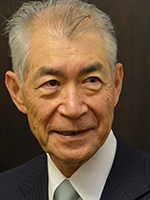
PD-1 Blockade Immunotherapy Against Cancer and Infectious Diseases
Tasuku Honjo, Japan
Tasuku Honjo is Professor of Immunology and Genomic Medicine at Kyoto University, and President of the Foundation for Biomedical Research and Innovation in Japan. Professor Honjo has made groundbreaking discoveries in the field of immunotherapy. He is best known for two major discoveries: the role of programmed cell death protein 1 (PD-1) in the immune response, and the activation-induced cytidine deaminase (AID) enzyme that is essential for class switch recombination.
He has received numerous awards and honours for his pioneering work, including the Order of Culture from the Emperor of Japan, the Robert Koch Prize, and the Imperial Prize of the Japan Academy. He is also an honourary member of the American Association of Immunologists, a foreign associate of the National Academy of Sciences, a member of Leopoldina (The German Academy of Natural Scientists), and a member of the Japan Academy. Professor Honjo graduated from the Faculty of Medicine at Kyoto University in 1966. After obtaining his PhD in Biochemistry, he spent four years in the United States as a post-doctoral fellow, first at the Carnegie Institution of Washington and then at the National Institutes of Health where he initiated studies on immunoglobulin genes.
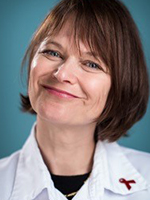
Antiretroviral Therapy and Beyond
Alexandra Calmy, Switzerland
Alexandra Calmy is an Associate Professor and Head of the HIV and AIDS Unit at the Geneva University Hospital. Her research interest is in the public health and humanitarian response to HIV and AIDS, specifically the provision of antiretroviral therapy and the management of side effects in resource-limited settings. Professor Calmy worked as a medical doctor with Médecins Sans Frontières (MSF) in Cambodia in 1996 and has supported MSF’s HIV and AIDS work for over 10 years.
She is a member of World Health Organization (WHO) working groups on the writing and the implementation of guidelines related to the treatment of HIV in developing countries since 2001. Professor Calmy is the Head of the CSS6 committee at the ANRS (The French National Agency for Research on AIDS and Viral Hepatitis), a member of the scientific board of the Swiss HIV Study Cohort (SHCS), and the Federal Commission for Sexual Health in Switzerland. Professor Calmy is also a reviewer for numerous well-recognized medical journals and has published over 100 articles in peer-reviewed medical journals. She is a medical doctor, trained in internal medicine and in infectious diseases from the University of Geneva. Professor Calmy also holds a PhD in Clinical Research on HIV and AIDS from the University of New South Wales.
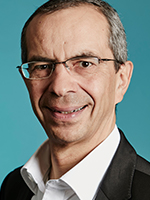
Challenges and Novel Approaches to Cure HBV Infection
Fabien Zoulim, France
Fabien Zoulim has been a Professor of Medicine at Lyon I University since 1997. He is currently the Medical Director of the Hepatology Department at the Hospices Civils de Lyon and the Scientific Director of the Department of Immunology and Virology at the Cancer Research Centre of Lyon INSERM Unit 1052, where he leads the team on antiviral therapy for viral hepatitis. Dr Zoulim has served as an Associate Editor for the Journal of Hepatology and is the Associate Editor for Gut. He also served as an expert in the Microbiology Study Section at INSERM (The French National Institute of Health and Medical Research) and is currently the Head of the Clinical Viral Hepatitis Study Section at ANRS (The French National Agency for Research on AIDS and Viral Hepatitis). He was a Governing Board member of the European Association for the Study of the Liver (EASL) and received the William Prusoff Award in 2004 from the International Society for Antiviral Research in recognition of his work in the field of hepatitis B (HBV) molecular biology and anti-HBV therapy. He has been the Scientific Coordinator of the European community-funded Network of Excellence, which focuses on the management of antiviral drug resistance, and is currently the Head of the HBV Cure Programme at ANRS. Dr Zoulim is a recognized expert in the field of viral hepatitis and antiviral therapy, and has published more than 400 articles. He obtained his medical degree in Gastroenterology and Hepatology from the Lyon Medical School in 1991. He also holds a PhD in Molecular and Cellular Biology, and he was a post-doctoral researcher at the Fox Chase Cancer Center.